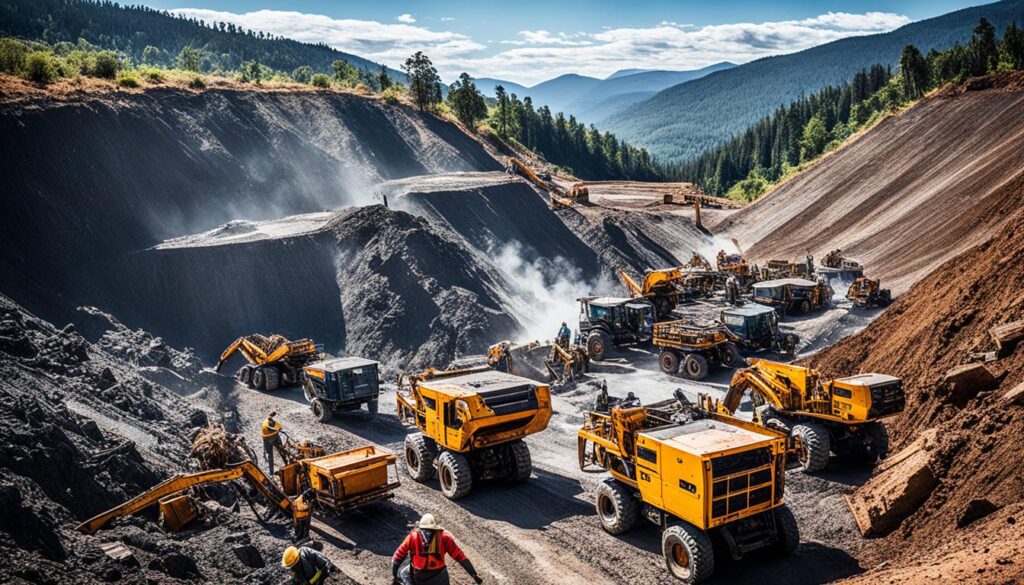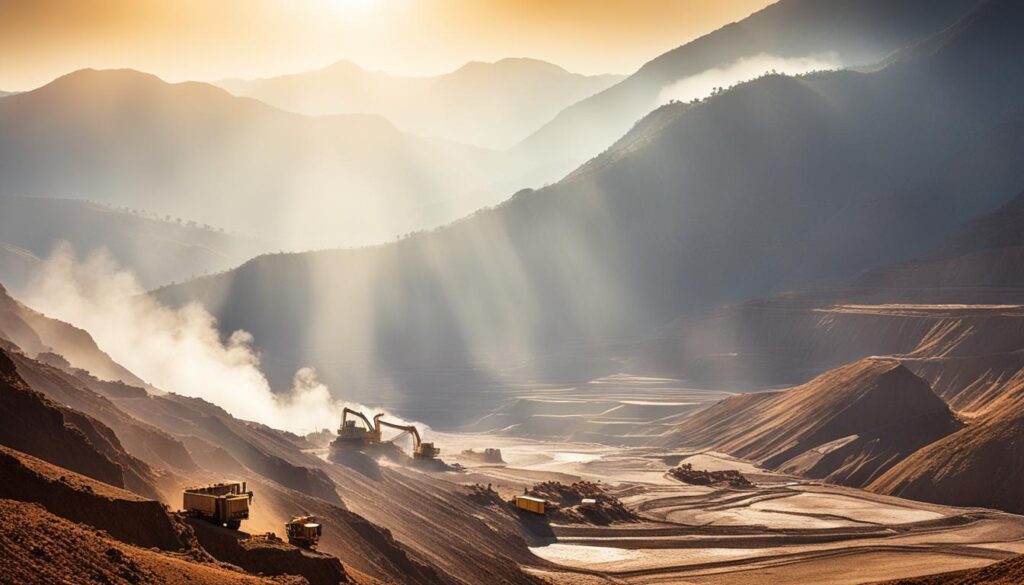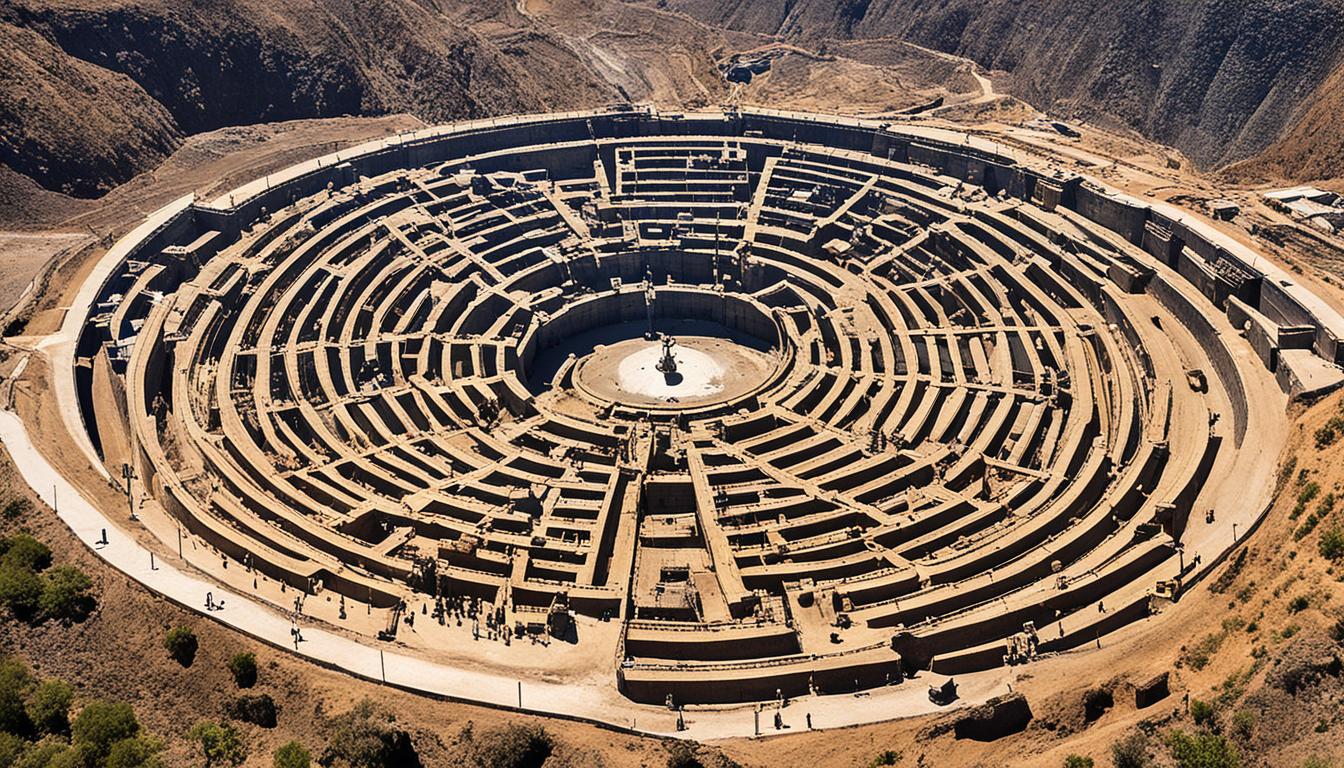Ethiopian Gold Reserve
Welcome to our story about the Ethiopian Gold Reserve. This topic is big in the African gold world. Today, we’ll dive into the big gold potential in Ethiopia. We’ll see how it boosts the country’s economy.
Ethiopia owns a lot of gold, which grabs the attention of investors and mining companies everywhere. In fact, by 2020, the country had around $3,046,114,359 USD in gold reserves, as stated by the World Bank. This shows how important gold is for Ethiopia.
Image source:
The Potential of Ethiopian Gold
Many see Ethiopia’s gold reserve as a key player in Africa. The nation is rich in coal and iron, setting the stage for a booming mineral sector. In 2019, it produced 3.18 tons of gold, a huge boost for its economy.
This wealth has caught the eye of global investors. Ethiopia’s ample resources and ideal mining environment attract mining companies. Those looking to tap into this potential find exciting prospects in Ethiopian gold.
Gold: A Driving Force
Gold is a major force in Ethiopia’s mining economy. It is key in creating jobs, pulling in investments, and spurring economic growth. This sector is vital for the country’s development.
The industry’s steady growth shows it’s on the right track. With abundant gold stocks and great mining conditions, Ethiopia’s gold future looks bright.
Mining Opportunities in Ethiopia
Ethiopia is becoming a great place for foreign investors, especially in the gold industry. The country’s laws make it easy for new gold mining investments.
Companies like Akobo Minerals are exploring the country. They have found high-grade gold deposits. This shows Ethiopia has a lot of mining chances.
Ethiopia is attractive to foreign investors because of its large gold reserves. It has a lot of potential for gold mining. This makes it a good place for mining ventures.
Ethiopia has a stable government and supports the mining industry. The government makes it easier to invest by simplifying rules and being transparent.
Investing in Ethiopian gold is a great opportunity. The country has many mineral resources and friendly investment policies. This makes it a good place for long-term investment success.
Foreign companies investing in Ethiopian mining can benefit a lot. They can find big gold reserves. Investing here can help with the country’s economic growth and benefit the companies too.
Challenges and Balance in Ethiopian Mining
Ethiopian mining is working to overcome several hurdles. It needs to tackle these issues to thrive. A key problem is its heavy reliance on gold mining. Gold makes up 93% of the sector’s value. This focus causes an imbalance and makes the industry prone to global gold market changes.
To make the mining sector stable and sustainable, it must branch out from gold. Exploring other minerals that Ethiopia offers is essential. This way, mining companies in Ethiopia can lower risks. They can also help the country’s mining industry grow in diverse ways.
Artisanal mining presents another big challenge in Ethiopian mining. These small-scale miners are important but often face issues. For example, their work isn’t always well managed. This leads to problems like using up resources too quickly, harming the environment, and dangerous work conditions.
It’s vital to organize and oversee the work of artisanal miners. They should get support and training, and ensure they mine responsibly. Doing this helps the artisanal mining sector and supports a strong, long-lasting mining industry in Ethiopia.
Finding the right mix between foreign investments and empowering local people is also crucial. While outside money, technology, and knowledge are helpful, locals must benefit too. This should include creating jobs, helping people gain skills, and supporting local companies.
Striking a good balance between international investments and local support is key. This way, Ethiopia can enjoy the best of mining with fewer downsides. To fully develop the mining sector, dealing with these issues effectively is critical. A fair and sustainable mining industry will drive Ethiopia’s success in mining.

Supportive Mining Laws in Ethiopia
Ethiopia has created laws to make investing in mining better. This helps both local and global investors use the country’s gold and other minerals. The government’s mining rules ensure fairness for everyone involved.
The laws also set how much businesses have to pay the government for the minerals they take out. This cost is between 2% and 7% of the mineral’s value. It helps the government make money and keep the environment safe.
Ethiopia focuses on doing mining in ways that do not harm the environment. It wants mining to help the people living in those areas too. This makes Ethiopia a good place for mining companies that care about the planet and the people they work with.
Corporate Social Responsibility in Ethiopian Mining
Ethiopia cares a lot about making sure mining helps the local communities. It makes mining companies build things like schools and hospitals. They also have to create jobs and support local businesses.
This shows Ethiopia’s goal to have mining benefit everyone. It’s about growing the economy but also making sure people’s lives are better. Ethiopia sees being fair to the local people as very important.
Commitment to Environmental Stewardship in Ethiopian Mining
Ethiopia is serious about not damaging nature during mining. It wants to save the environment for its future. So, mining companies follow strict rules to protect the land and use water wisely.
By mining responsibly, Ethiopia protects plants, animals, and forests. This way, mining can keep going without hurting the environment. It’s about making sure future generations can benefit too.
The Importance of Artisanal Mining in Ethiopia
Artisanal mining is a big part of Ethiopia’s mining scene, making a mark on the economy. Between 2017 and 2019, a lot more gold was pulled out by small-scale miners. This shows how valuable their work is. These miners are often in areas far from cities and towns. But, they play a big role in local jobs and the nation’s gold supply.
The National Bank of Ethiopia is backing these small-time miners. They have set up things to help them and make things easier for them to work. This backing boosts the economy at both local and national levels.
It’s important to find a middle ground between big mining companies and small-scale miners. Big mining brings in lots of money and new technology. On the other hand, small-scale work helps local people join in and earn money.
The work of small-scale miners is key to Ethiopia’s journey in mining and economy. With the right strategies, Ethiopia can make the most of its small-scale mining. This will help the country grow in a good way, helping both its people and bottom line.
Growth and Transformation in Ethiopian Mining
Ethiopia’s economy has been growing fast, averaging 10.2% GDP growth from 2010 to 2020. This boost is largely due to progress in the mining sector. It has opened up new opportunities for development and growth.
The country set major goals under the Growth and Transformation Plan II for the mining industry. It’s looking to reach 20% annual growth rates in mining. This strategy shows how serious Ethiopia is about making the most of its natural resources.
The focus on mining is turning it into a key driver of economic success and new job opportunities. It promises a better life for the people. As Ethiopia invests more in mining, the chances for even more growth are huge.
The Role of Mining in Economic Development
Mining contributes a lot to the economy by earning money from abroad, creating jobs, and supporting local businesses. If Ethiopia uses its mining resources well, it can grow its economy sustainably. This means a better life for its citizens.
Mining also brings in investments, both local and international. This means more money and new technologies coming in. It leads to more jobs, more exports, and more income for the country. This extra money can be used to build roads, schools, and help communities.
The growth in mining means more people get to work, either directly in mining or in other related fields. This helps lower unemployment, increases how much money families make, and improves how people live.
Investing in a Sustainable Future
Ethiopia is focused on doing mining the right way, to protect the environment and support people. It has rules in place to make sure mining doesn’t harm the land or the communities around it. Plus, it takes care of the workers.
By mining responsibly, Ethiopia hopes to keep growing its economy while looking after the environment. This way of mining aims to last a long time and keep the country beautiful for future generations.

Gold Deposits in Ethiopia
Ethiopia is known for its various gold deposits, catching the eye of the mining world. The Lega Dembi and Sakaro mines, run by private companies, are key to the country’s gold output. Together, these mines create about 5 tons of gold yearly, proving the country’s wealth in gold.
Many have put effort into searching for more gold in areas like Oromia and Tigray. In these regions, it’s believed there are gold reserves worth billions. This makes Ethiopia a top spot for mining companies eager to explore its gold riches.
Gold mining in Ethiopia is not a new thing; it has a history that goes back thousands of years. This shows how deep the tradition of gold mining runs in the country. Thanks to its current reserves and mining history, Ethiopia is considered a major player in the world of gold.
The Legacy of Ethiopian Gold Mining
The Asosa Zone and its Gold Mines
The Asosa zone is close to the Sudanese border and known for the Asosa Gold Mines. These mines have been active for thousands of years. They are closely connected to the ancient Egyptian empire.
This area is rich in resources like quartz, schist, and pegmatite rocks. This makes it a good place to find gold. Mines like Lega Dembi and Tigray are already working in the Asosa zone.
Ancient Egyptian Connection
The Asosa zone’s gold mines are linked to the ancient Egyptian empire. They were key in supplying gold to Egypt. This shows a strong trading and cultural bond between the two regions.
The wealth of gold found in the Asosa zone is still interesting to researchers today. It helps us learn about the old economic and cultural connections.
Ethiopia’s Economic Growth through Gold
Ethiopia sees how important gold is to its economy. We plan to add one million jobs in gold mining. This will help us make over a billion dollars from exporting gold every year. With the gold we have, Ethiopia could become a major player in the global gold market. We are working hard to use our gold to grow our economy.
Gold plays a key role in Ethiopia’s economic growth. It is highly valuable and in great demand worldwide. Gold mines offer jobs in many areas like engineering, geology, and operating heavy machines. This helps create a strong, lasting job market for our people.
Gold mining is good for local economies too. It helps businesses and improves the area’s infrastructure. As our gold sector grows, we expect to see a boost in related industries like transport and manufacturing.
Environmental Sustainability
Even as we grow economically, we care about the environment. Our mining rules focus on being green and causing less harm. We want to mine gold in a way that lasts a long time without hurting nature.
We check how mining affects the environment very carefully. This is to make sure we keep our natural resources safe. We are determined to grow our economy while keeping our land healthy for future generations.
Our country is committed to making the most from our gold. This means more jobs, more money from exports, and a better environment. We believe Ethiopia’s future is bright, thanks to our gold industry.
Opportunities for Investors in Ethiopian Gold
Ethiopia is a top spot for those eyeing the gold mining field. Whether you’re investing solo or as part of a firm, this nation has plenty of chances to dive into its large gold reserves. Thanks to its improved governance and mining laws, Ethiopia is eager to welcome foreign players into its buzzing mining scene.
Akobo Minerals is one firm that has tapped into the profits of Ethiopian gold. By getting involved in the country’s gold scene, their work shows the gains possible. Investing here could mean supporting Ethiopia’s financial growth while reaping your own rewards from a smart investment choice.
To make your investment a win, tapping into Ethiopia’s mining industry support is key. The country’s policies and regulations aim to woo and help foreign investors. Think sweet incentives, better infrastructure, and a big promise on saving the environment.
By putting your money into Ethiopian gold, you get a shot at big financial payoffs. Plus, you’re helping the nation in many ways. Your move could lead to new jobs, help local areas, and push for friendlier mining ways.
The chance to invest in Ethiopian gold is solid. With smart moves and the right team, you could be in for a great run. We’re calling on you to look into what Ethiopian gold has to offer. Come along as we all dive into the many possibilities of this growing business.
Conclusion
Ethiopia’s gold reserve is key to its economic growth. Major mining companies are investing. The government is eager to support gold mining. This points to a bright future. If regulations are fair and investments continue, Ethiopia could lead in gold production.
Ethiopia is rich in gold resources. It has good rules for mining. Investors find it a great place to put their money. The future of the gold industry here looks good. It could bring jobs and a lot of money from selling gold worldwide. As Ethiopia discovers more gold, its economy will grow. It will also solidify its standing in the gold market.
Looking forward, gold mining in Ethiopia has great promise. The country has a lot of gold and good mining laws. This sets the stage for steady growth. With help from the government and investments, Ethiopia can make the most of its gold. It might even become a big name in global gold mining.







